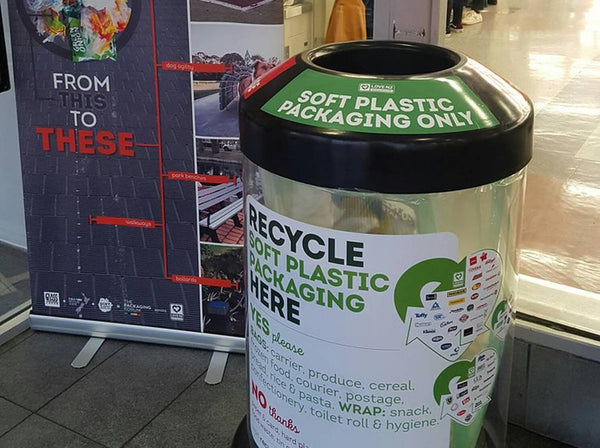Shopping Bags are now sent to Landfill as Soft plastics recycling put on hold for at least 3 months | Valdamark
Alex ToddThe country’s processing plants having hit recycling capacity.

In Australia shoppers are being told to dispose of their soft plastic waste following on from a government statement that the nations procession plants are operating at full capacity.
Their are now no plastic recycling collections in the country until April, however this is unconfirmed and could potentially be longer.
Its become a bit of a hot topic online with many taking to Social Media to vent their frustration at the official advise to put plastics in with the regular un-recyclable waste.
Many have decide to start hoarding it.
The Packaging Forum is responsible for the recycling in Australia but the statement confirmed they have been inundated with soft plastic and would now have to remove all the collection bins nationwide.
They hit the first bump in road back in early December when the forum starting accepting New Zealand plastics following China’s decision to not allow any more plastic waste to be imported to its shores.
Soft Plastics can be converted to a variety of everyday items including park benches, security bollards, electrical cables and wiring.
There has also been a warning issues by the packaging forum stating that soft plastics need to be stored in a waste bin to avoid contamination, making them unsuitable for processing.
This has angered many shoppers online who have suggested that maybe the plastic waste should just be dumped in the supermarkets car park, as they generate most of it.
Shredding for a Sustainable Future
Plastics have been a hot topic in the waste and recycling conversation for years, with a recent focus on phasing out single-use plastics. But as we look ahead to the next 12 months, attention is shifting towards the more complex issue of soft plastics recycling.
Flexible plastics have long been a staple in packaging, medical devices, construction materials, and various other industries. This is due to their versatility and durability. However, in recent times, the spotlight has turned to what happens to these materials at the end of their life cycle.
Supermarket as Collections Points
To combat the landfilling and incineration of soft plastics, supermarkets in the UK have introduced collection points for recycling. Unfortunately, the nation's recycling infrastructure has struggled to process these materials effectively. In 2020, despite constituting 22% of all consumer plastic packaging in the UK, only 8% of these soft plastics were recycled. This difficulty in handling them through traditional mechanical methods has earned them a reputation as 'problematic.'
In response, local authorities have been tasked with implementing collection processes and infrastructure to recycle soft plastics by 2027. UK Research and Innovation's SSPP Challenge and the Innovate UK Knowledge Transfer Network initiated the Smart Sustainable Plastic Packaging (SSPP) competition. It aims to discover innovative design solutions to capture and repurpose this household packaging waste.
Shift for a Successful Soft Plastics Recycling
While these efforts are commendable, it's essential to address how recycling facilities will process these challenging materials. There must be a shift in the approach to collecting and handling plastics to ensure success.
One crucial element is handling soft plastics within the country of origin. An investigation revealed that some supermarkets' soft plastics were being shipped overseas. This investigation result raises concerns about their uncertain fate. The importance of handling plastics domestically has become a priority. This means we need to focus on recycling rather than energy recovery routes.
Soft plastics, such as bags and films, are notoriously difficult to recycle using conventional methods. They tend to tangle and disrupt processing equipment. Shredding plays a pivotal role in addressing this challenge.
Once soft plastic materials are shredded, they become more manageable. They can undergo further processing using different recycling techniques to create new products. Shredding is a crucial step in ensuring the effective recycling and reusing of soft plastics.
Sustainable Practices
The push for more sustainable practices and environmentally friendly alternatives to plastic is on the rise. Increased public awareness of the environmental impact of plastic waste, particularly single-use plastics, has resulted in a growing demand for responsible alternatives. This shift in mindset is likely to extend to the realm of soft plastics as well.
The UK Government has set ambitious targets to increase recycling rates. It aims for 70% of plastic packaging to be recycled by 2030. While progress is still required, the future of soft plastic recycling in the country appears promising. With the right mindset and a commitment to investing in the necessary technologies, it is possible to process complex plastic products. We can repurpose them as valuable resources. These measures can help the nation achieve its ambitious recycling goals.
In conclusion, the issue of soft plastic recycling is far from resolved. But with ongoing efforts and innovative solutions, the UK can make significant strides toward a more sustainable and environmentally friendly approach to these challenging materials. The future of soft plastic recycling depends on embracing these solutions and not leaving the problem to others.
Valdamark supply eco friendly FIBC bulk bags to industry. Get in touch to review your requirements.









